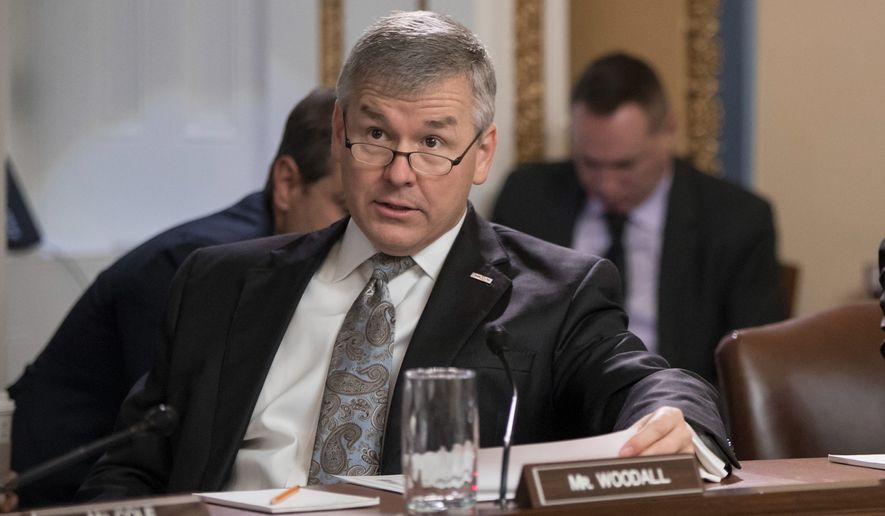Rep. Rob Woodall said he got the “shivers” when he heard President Trump promise Democratic leaders last month that he’ll come up with $2 trillion to spend on infrastructure.
The Georgia Republican said he has no idea where that money’s going to come from amid a government already deep red ink.
“For Pete’s sakes, we have a budget today — well, the one the president proposed had about a trillion dollar, a trillion and one, deficit in it just for 2020,” he told The Washington Times. “So if $2 trillion is so easy to get a hold of, we should probably get a hold of it and fill the budget gaps that we have today.”
Still, Mr. Woodall, who sits on the House Transportation and Infrastructure Committee, is optimistic that a deal can be done, as long as everyone keeps an open mind.
“There’s so many things that we agree on,” he said. “I just use this label that make my friends on the left get the shivers, and they use this label, which makes me get the shivers. But we’re saying the same thing, we’re just using labels that we each disagree with.”
In theory, infrastructure should be one of the easier lifts. Both sides generally agree it’s something the federal government has the power to do, and that it can pay dividends, if done right. And grand projects in lawmakers’ states or districts make for good campaign literature.
The sticking point is money.
Democrats say that’s easy — there are plenty of areas ripe for tax increases, especially after the GOP cut taxes just two years ago. Or there’s the option of a gas tax increase, asking those who use the roads to fund the construction boom.
Mr. Woodall isn’t a fan of the gas tax, saying it won’t be sustainable as Americans seek workarounds. But he is open to new revenue, including taxes on carbon emissions, car parts and even vehicle weight.
One particular idea he finds appealing is a user-pay model, in which taxpayers would pay based on how much they drive. There are multiple ways such a model could be implemented, Mr. Woodall said, including requiring an annual fee based on the miles traveled that drivers report on their registration forms.
What he doesn’t want is to tack $2 trillion onto an already record debt. He says taxes are preferable to that.
“Listen, if you don’t mind sitting in traffic and you don’t want those potholes filled, we’re not going to bill you another dollar. We’re gonna make it work with what we got,” he said. “But if you want more, you’ve got to pay for more — not your children, not your grandchildren.”
Democrats, for their part, have raised all sorts of other issues they say must be part of any deal. They walked out of their meeting with Mr. Trump saying he had agreed that broadband access counted as infrastructure, and would be dealt with.
Senate Minority Leader Charles E. Schumer, New York Democrat, also has said no bill can pass unless it addresses climate change.
Mr. Woodall said there’s a way to view the negotiations that might satisfy Mr. Schumer.
“Do we advantage ourselves, whether we’re climate change advocates or not, by having families sit in traffic for an extra 45 minutes every night burning their fossil fuel engines? The answer is no,” he said.
Republicans, meanwhile, are intent on cutting red tape surrounding massive projects.
For his part, Mr. Woodall said he’s interested in bringing innovative solutions to important projects. One example was finding a new way to alleviate traffic in Atlanta.
Traditionally, the solution would be to add lanes to the existing highways — but a company instead implemented an algorithm that tracks traffic to manipulate the traffic light system, which has been used to shave minutes off emergency vehicle response times.
Whatever projects this potential deal tackle and however it outlines how to go about doing that — Mr. Woodall knows that not everyone will be on board.
“Are we going to satisfy the fringes of both conferences and caucus? It’s not. But is it going to be good for America, good for our economy and good for the future? It is. And I’m excited about that,” he said.
• Gabriella Muñoz can be reached at gmunoz@washingtontimes.com.




Please read our comment policy before commenting.